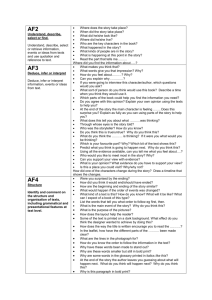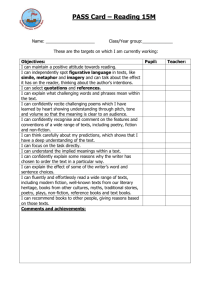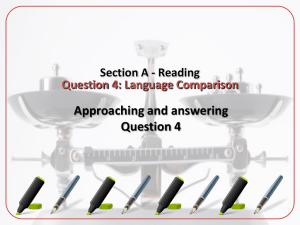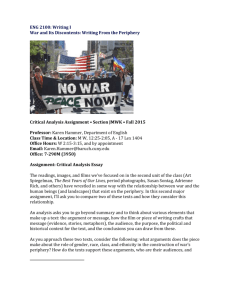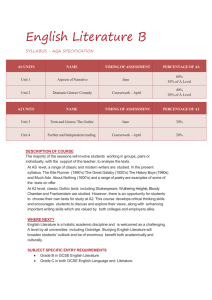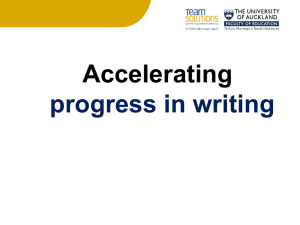Writing Competencies Assessment Rubric
advertisement
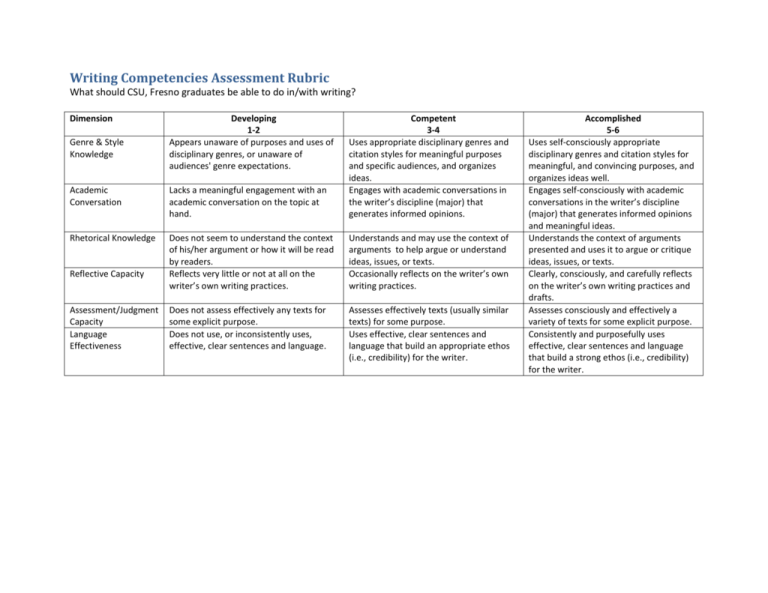
Writing Competencies Assessment Rubric What should CSU, Fresno graduates be able to do in/with writing? Dimension Academic Conversation Lacks a meaningful engagement with an academic conversation on the topic at hand. Competent 3-4 Uses appropriate disciplinary genres and citation styles for meaningful purposes and specific audiences, and organizes ideas. Engages with academic conversations in the writer’s discipline (major) that generates informed opinions. Rhetorical Knowledge Does not seem to understand the context of his/her argument or how it will be read by readers. Reflects very little or not at all on the writer’s own writing practices. Understands and may use the context of arguments to help argue or understand ideas, issues, or texts. Occasionally reflects on the writer’s own writing practices. Does not assess effectively any texts for some explicit purpose. Does not use, or inconsistently uses, effective, clear sentences and language. Assesses effectively texts (usually similar texts) for some purpose. Uses effective, clear sentences and language that build an appropriate ethos (i.e., credibility) for the writer. Genre & Style Knowledge Reflective Capacity Assessment/Judgment Capacity Language Effectiveness Developing 1-2 Appears unaware of purposes and uses of disciplinary genres, or unaware of audiences' genre expectations. Accomplished 5-6 Uses self-consciously appropriate disciplinary genres and citation styles for meaningful, and convincing purposes, and organizes ideas well. Engages self-consciously with academic conversations in the writer’s discipline (major) that generates informed opinions and meaningful ideas. Understands the context of arguments presented and uses it to argue or critique ideas, issues, or texts. Clearly, consciously, and carefully reflects on the writer’s own writing practices and drafts. Assesses consciously and effectively a variety of texts for some explicit purpose. Consistently and purposefully uses effective, clear sentences and language that build a strong ethos (i.e., credibility) for the writer. Dimension Genre & Style Knowledge Academic Conversation Developing 1-2 Appears unaware of purposes and uses of disciplinary genres, or unaware of audiences' genre expectations, which includes a lack of control over appropriate style conventions (e.g., MLA, APA, Chicago, etc.), often misuses quoted material (or doesn't quote found material at all), or doesn't cite appropriately or consistently, and shows inconsistency in organizing and expressing ideas, which includes a lack of appropriate word choice and language use. Competent 3-4 Uses appropriate disciplinary genres for meaningful purposes and specific audiences, which includes an emerging knowledge and proficiency with the appropriate style (e.g., MLA, APA, Chicago, etc.) and citation guidelines, appropriate ways of organizing and expressing ideas, language use, word choice, and sentence structures that are native to that discipline or appropriate to the discussion being attempted by the writer. Lacks a meaningful engagement with an academic conversation on the topic at hand and that is appropriate to the writer’s discipline (major) that generates informed opinions, which may appear as writing that does not incorporate any research or found academic materials, or is a clearly one-sided argument in which sources only offer one position; often important or reasonably controversial claims will not be supported, sources used may not be interrogated for their validity, appropriateness, or reliability; and there is a general lack of a developed, sustained, coherent focus/argument that answers or explores a question in a structured manner. engages with academic conversations in the writer’s discipline (major) that generates informed opinions, which includes effectively integrating outside sources in support of claims, interrogating the validity and reliability of ideas in sources, showing some awareness of the significance of sources cited (i.e., sources are not chosen haphazardly or randomly), and developing a sustained, coherent focus/argument that answers or explores a question in a structured manner. Accomplished 5-6 Uses, often self-consciously, appropriate disciplinary genres for meaningful purposes and specific audiences, which includes a clear knowledge and proficiency with the appropriate style (e.g., MLA, APA, Chicago, etc.) and citation guidelines, organizes and expresses ideas coherently and persuasively, and uses consciously language, word choice, and sentence structures that are appropriate, sometimes original, and native to that discipline or the discussion being attempted by the writer. engages self-consciously with academic conversations in the writer’s discipline (major) that generates informed opinions and meaningful ideas, which includes effectively integrating outside sources in support of claims, commenting on those conversations, perhaps revealing assumptions and points of agreement and disagreement, interrogating the validity and reliability of ideas in sources, showing awareness of the significance of sources cited, and developing a sustained, coherent focus/argument that answers or explores a question in a structured manner. Dimension Rhetorical Knowledge Reflective Capacity Developing 1-2 Does not seem to understand the context of his/her argument or how it will be read by readers, appeals to readers in simplistic ways, and may not distinguish between texts and their authors, issues/questions and the ways those issues/questions are articulated by various voices/people in the field; does not take into consideration the context of discussions and problems, or the authority (or lack of authority) of some voices/people when considering various positions and arguments; often does not respond in a discipline-appropriate way, or even in a sophisticated manner. Reflects very little or not at all on the writer’s own writing practices (how he/she created drafts or read texts for particular purposes), drafts, or revision practices, doesn’t seem to think about the act of writing or revising, or the text as a text that is produced by drafting and revising. Competent 3-4 Understands and may use the context of arguments to help argue or understand ideas, issues, or texts, appeals to readers in generally effective ways, responds in a discipline-appropriate and a semisophisticated manner, which includes the ability to explain the context and influences that affect text’s being used. Accomplished 5-6 Understands the context of arguments presented and uses it to argue or critique ideas, issues, or texts, appeals to readers in fluent, effective, and conscious ways, may discuss the rhetorical aspects of texts and arguments (how texts make their arguments), and responds in a disciplineappropriate and sophisticated manner. Occasionally reflects on the writer’s own writing practices (how he/she created drafts or read texts for particular purposes) and drafts, has thought carefully about how and why the writing and revision decisions that were made are appropriate for the document or argument, and what potential effects on readers those decisions may have. Clearly reflects on the writer’s own writing practices and drafts by conscious and careful choices in the text and a discussion of them as purposeful decisions that make meaning for readers, reveals the writer’s thinking in meta-discourse in the text (i.e. moments in the text where the writer discusses how he/she is making meaning or understanding something, another text, or an assumption or idea, or when he/she steps outside the argument to make a comment that focuses the reader in productive ways) or reflective documents, which also can explain how and why writing decisions are made and what potential effects on readers those decisions may have. Dimension Assessment/Judgment Capacity Language Effectiveness Developing 1-2 Does not assess effectively a variety of texts (e.g. the writer’s own, peers’ texts, and/or published texts) for some explicit purpose that is clear in the written assessments or discussions of those texts; any discussion or assessment of any text often lacks contextual information about the argument and/or author, and may not be clear on why something is good or bad in a text; there is not much indication that the writer can articulate clear judgments based on textual and other evidence that are informed by appropriate expectations for those texts (evidence-based judgments). does not use, or inconsistently uses, effective, clear sentences and language, which causes the writer’s ethos (i.e. credibility and authority on the subject) to be considered unreliable; the writer appears to not be able to edit drafts successfully, since the language, grammar, and syntax is not effective, clear, or powerful; sometimes the language may be relatively clean but shows no variety of sentence structures, opting for safe, short, and repetitive sentences. Competent 3-4 assesses effectively a variety of texts (e.g. the writer’s own, peers’ texts, and published texts) for some purpose that may be clear in the written assessments or discussions of those texts, which includes demonstrating the capacity to make clear judgments based on textual and other evidence that are informed by appropriate expectations for those texts (evidencebased judgments). Accomplished 5-6 assesses consciously and effectively a variety of texts (e.g. the writer’s own, peers’ texts, and published texts) for some explicit purpose that is clear in the written assessments or discussions of those texts and moves the discussion forward, often in interesting ways, which includes demonstrating the capacity to make clear judgments based on textual and other evidence that are informed by appropriate expectations for those texts (evidencebased judgments). uses effective, clear sentences and language that build an appropriate ethos (i.e., credibility) for the writer, even if occasionally there are errors; the writer appears to be able to edit drafts successfully, moving them toward increasing effectiveness, clarity, and power, and using a variety of sentence structures. consistently uses effective, clear sentences and language that build a strong ethos (i.e., credibility) for the writer; there are few noticeable errors in the writing; the writer appears to be able to edit drafts successfully, moving them to an effective, clear, and powerful draft, and purposefully uses a variety of sentence structures that work toward positive effect on readers.
